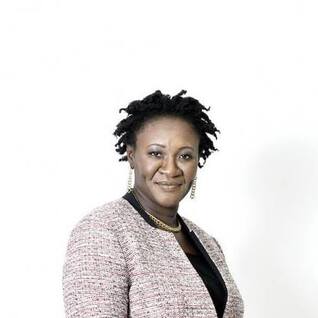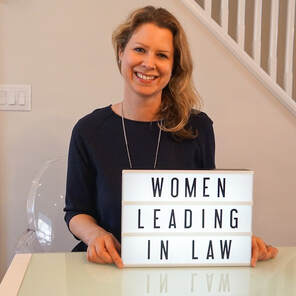 Today's profile features Kemi Oduwole. I was introduced to Kemi through her executive assistant, Veronica, who told me I should definitely profile Kemi. After reading her answers I agree completely. I love learning about all of these amazing leading lawyers and different practice areas: 1. Tell me a little about your practice or business. I am a partner at Topmarké Attorneys LLP, a medium sized boutique in Toronto. We practice all areas of law including immigration, litigation, family law, child protection, business law, corporate and mental health law. I specialise in mental health law, family law but predominantly immigration and refugee law. I am a foreign trained lawyer from Nigeria. I had practiced corporate law and was involved in civil litigation for years before teaching at the Nigerian Law School, where I was for about 10 years before relocating to Canada in 2010. 2. Why did you go to law school? The first thing that attracted me to law was the robe of lawyers (wig and gown). I loved seeing lawyers in their robes on TV. At a point in high school, I was discussing my career options with my dad and I mentioned law. He found it rather strange because no one in my extended family studied law. We had doctors, engineers, architects but no lawyer. My father, an accountant himself, tried so much to motivate me to study accounting. In my bid to convince my father that law was better for me, I discovered during my research the enormous role of lawyers in society. I got hooked and have since never let law go. I have always enjoyed solving problems. I saw law as a tool of solving individual and societal problems. Studying law for me was a means of developing skills to solve problems. 3. How did you get to where you are today? Design? Chance? Both? I got to where I am today by design and divine direction. From the moment I decided to study law, I worked harder than I had ever done in my life. I studied hard. After law school, I worked in a private practice for about five years before I started teaching at the Nigerian Law School. My motivation for coming to Canada was actually to pursue my PhD. That was the main reason my family applied for the Canadian Permanent Residence. I have had the opportunity of travelling to other countries for my PhD but I did not want to leave my family. Canadian Permanent Residence gave us the option of being together as a family while still following my dreams. Upon getting to Canada, I could not start the PhD program immediately. I decided, while I was waiting, to undertake a master’s program, affording me the opportunity to better understand the Canadian educational system. I also decided to start the Canadian bar licencing process at the same time. The truth was that I had no interest in practice at that time. I just thought it would be a good use of my time and it would afford me the opportunity of studying the Canadian legal framework, which would be a great foundation for my PhD. I was lucky that I was able to secure admission at the University of Toronto. While at U of T, I simultaneously wrote my NCA and bar exams the same year. I also applied for PhD at U of T. Unfortunately, I did not secure an admission. Fortunately for me I passed my bar exams, so I decided to go into practice. I was reluctant to go into practice because it was not in my plan, but my husband encouraged me to try it while I put in another application for PhD the next year. That was how I started practicing and have not since then applied for a PhD program. This is where the divine direction comes in. 4. What is your most significant achievement? What are you proud of? I have two master's degrees, one from University of Lagos in Nigeria and the other from University of Toronto. I also have an uncompleted master’s program from the University of London. As a law teacher, I have published law textbooks, written articles in journals and presented at seminars. My greatest achievements however are my students and clients. I am delighted when I see my students excel and my clients happy. During my time as a teacher, I went outside the box in my teaching pedagogy to ensure that my students gained knowledge and had the ability to produce from that knowledge. I have a number of my students all over the world who have achieved a lot and made an impact in society. I am always excited when I travel and have people walk-up to me to introduce themselves as my past students and particularly tell me how I had motivated them. In my current practice, I work extensively with refugees, and foreign nationals seeking to migrate or remain in Canada. I have had moments when I cried with my clients at the refugee Board after hearings. We’ve had clients visit our office hungry with their children because they were not used to the food served at the shelters. Sometimes, it is very difficult to get information from such clients due to the trauma they have experienced. It is uplifting when you are able to assist the vulnerable. It is however not always a success story. I have had nights when I would be unable to sleep because I know my client is being deported; or the pumping of blood in my heart when I receive decisions from the refugee board wondering whether it is positive or negative. I’ve had days whereby I had to take a moment and pray for my clients because of the fear I have for them if their claims were not accepted. I will never forget a young lady who had been in immigration detention for some time due to her past criminality. She was denied bail and was about to be deported when my firm was retained at the last minute. Upon reviewing her file, her case appears to be a lost battle with deportation looming in the horizon. However, I could not give up on her. Within a limited time we were at the Federal Court and her removal was stayed. It was a celebration in our office. The joy was as if we were each given gold medals. Not only was her removal stayed we were able to secure bail for her by innovative means approved by the immigration division. It is stories like and my ability to see family reunite when they are sponsored after years of separation that keep me going. With respect to family law, it is extremely difficult when you see people who love themselves turn into enemies, and then they have their children, who unfortunately are used as pawns for bargains, in the middle. From experience, I have seen that it is the hurt and emotional disappointment that urges some irrational decisions which unnecessarily prolong such matters. I am quick to advise my clients that in issues like this, the truth is there is no victor or loser. The objective is to find an amicable resolution. I make them see realistically that, the more the matter is dragged on, the more legal fees would be incurred, and the more they may be worse off in the end. That is why the initiative and promotion of collaboration in resolving family law disputes is largely advocated for. My greatest achievement is the success of my clients. I have had young refugee children especially teenagers who had troubles due to their past experiences. I have introduced some to mentors and I have mentored some and they are on the right track and I am very proud of them. A number of them are now graduates. It is always a joy when you see vulnerable people who came to Canada with nothing, fearful for their lives and in turn become successful members of society. That is our success story as a firm and as a society. Our clients are not numbers or files, they are people and they matter to us. 5. What are some key challenges, and more importantly, opportunities for women in law? Gender discrimination still exists in this profession. Notwithstanding, there are countless opportunities for women and we are constantly making impacts within the field. We as women ourselves need to constantly encourage one another to take charge of these opportunities. We need to share information and rely on each other where ever and whenever there is an opportunity to do so. 6. What advice would you give a woman starting her legal career? Determination and self-realization is key. It is very important for women to believe in themselves, and they should not be afraid to take bold steps. Never allow people to define you. In addition, being surrounded by a support network is amazing. ----------------------------------------------------------- Thank you Kemi for taking the time to answer these questions and sharing your practice with us. I started this blog series because I was tired of hearing about women leaving law and wanted to hear about women leading in law. The "Women Leading in Law" series focuses on good news stories and highlights amazing women succeeding in the legal profession. Each post includes the profiled lawyer's answers to six questions. Prepare to be inspired! ICYMI - previous posts profiled the following amazing lawyers: Anne-Marie McElroy, Jennifer Gold, Jordana Goldlist, Megan Keenberg, Yadesha Satheaswaran, France Mahon, Sarah Molyneaux, Richa Sandill, Vivene Salmon, Kim Whaley, Alisia Grenville, Frances Wood, Maggie Wente, Anita Szigeti, Neha Chugh, Christy Allen & Nancy Houle, Suzie Seo, Kim Gale, Alexi Wood, Melissa McBain, Erin Best, Gillian Hnatiw, Melanie Sharman Rowand, Meg Chinelo Egbunonu, Lisa Jean Helps, Nathalie Godbout Q.C., Laurie Livingstone, Renatta Austin, Janis Criger, May Cheng, Nicole Chrolavicius, Charlene Theodore, Dyanoosh Youssefi, Shannon Salter, Bindu Cudjoe, Elliot Spears, Jessica Prince, Anu K. Sandhu, Claire Hatcher, Esi Codjoe, Kate Dewhirst, Jennifer Taylor, Rebecca Durcan, Atrisha Lewis, Vandana Sood, Kathryn Manning, Kim Hawkins, Kyla Lee, and Eva Chan.
0 Comments
Your comment will be posted after it is approved.
Leave a Reply. |
Erin C. Cowling is a former freelance lawyer, entrepreneur, business and career consultant, speaker, writer and CEO and Founder of Flex Legal Network Inc., a network of freelance lawyers.
Categories
All
Archives
June 2023
|
|
(C) 2014-2024 Cowling Legal. All rights reserved.
|
Please note I am not currently practicing law.
Information on this website does not constitute legal advice and is for informational purposes only. Accessing or using this website does not create a solicitor-client relationship. See website Terms of Use/Privacy Policy. info@cowlinglegal.com
3080 Yonge Street, Suite 6060 Toronto,ON M4N 3N1 (appointment only) |







 RSS Feed
RSS Feed
